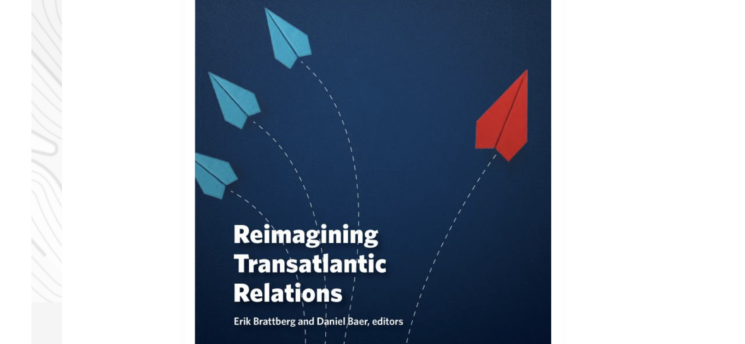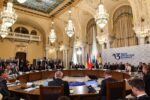For decades, transatlanticism—a robust worldview based on human rights, democracy, and open markets—has been a core pillar of the rules-based international order that is under so much duress at the moment. If one is in trouble, the other one will feel the pain, and vice versa.
As for most Germans from my generation, the transatlantic relationship is a personal affair. It provided the security Germans needed during the Cold War. It ensured Westbindung— Germany’s firm embeddedness in the community of free and democratic countries. And it was the foundation on which our national unity was built in 1990. This is why I deeply care about the mighty challenges we face as transatlantic partners today. As the world struggles to find a new form of order amid a pandemic, power shifts, and political uncertainty, transatlantic relations are in a phase of reorientation. This does not come as a surprise. For decades, transatlanticism—a robust worldview based on human rights, democracy, and open markets—has been a core pillar of the rules-based international order that is under so much duress at the moment. If one is in trouble, the other one will feel the pain, and vice versa.
IDENTIFYING THE KEY CHALLENGES
What can be done? Looking beyond the headlines, four challenges are of particular importance for the future of transatlantic relations.
The first challenge is to what extent U.S.-China relations are turning confrontational. Predictions range from inevitable war to joint stewardship of globalization. Europeans are already gravely affected by China’s rise and the U.S. response. Their role in that confrontation will be defined, either by themselves or by Washington and Beijing. There is no doubt in my mind that Europe will come to the defense of freedom and openness and that we have to strengthen democracy and human rights. This is very much in our interest. To do this, Europe needs to be strong, resilient, and capable of acting in service of both principles and interests. But something else is crucial here as well: will the United States still be interested in the fate of its European allies? Will Europe be seen by Washington as a key asset in that great power competition with Beijing? At the very least, European dependence on U.S. security guarantees make these questions crucial for the future of transatlantic relations.
Closely connected to this first challenge comes a second one. It is the seemingly eternal question of whether Europe can become a forceful player on the world stage. Europe needs to develop an ambition to have a say in global affairs. It needs to strengthen its ability to act, also militarily. It needs to fully grasp how to manage its disunity so that this disunity does not become its downfall. And it needs to be economically strong and technologically capable. Increasingly, power grows out of the ability to create, utilize, and protect data and the networks through which it flows. Will Europe become a driver and champion of the exploding fourth industrial revolution? All of this will be key for transatlantic relations: for how we trade between the United States and Europe, how we define shared interests, how we can be each other’s reliable allies, how our militaries interoperate, and whether our mindsets are compatible.
Third, how can Europe and the United States jointly manage the off-kilter nuclear balance in Europe after the end of the Intermediate-Range Nuclear Forces Treaty, Russia’s massive arms build-up, and the rise of China? The latter casts its long shadow over the European power balance. Europe is no longer the main theater in which the global balance of power is being determined. And yet it is already at the receiving end of the arms race that has heated up between China and the United States, not least because Russia exploits the global focus on the Indo-Pacific by expanding its threat potential in Europe. How can nuclear deterrence survive and a healthy balance of power be maintained in Europe? This question matters for Europeans and Americans alike. Neither of them has found a good answer yet.
Fourth, can Germany become a backbone of European resilience? My country, for a long time, was the object, not the subject, of global power politics. This situation changed thirty years ago when the Cold War ended. But this hiatus’s impact on Germany’s political and strategic culture can still be felt today. Slowly, the country assumes more responsibility, increases its defense budget, and realizes to what extent other countries must and want to rely on it. No doubt it needs to be quicker, and we are working on it every day.
For many decades, the German question was whether the country was a fully committed member of the family of Western nations. Today, the German question is whether Germany can become a protector of the wider West, that is to say, of any country subscribing to and acting upon Western principles and values. Transatlantic relations can only be in full bloom and at maximum impact if Germany can complete its path toward being a much bigger force multiplier for the West, for NATO, and for the EU. We have made great progress toward that goal over the last decade, but we need to press on. I see it as my task as the German defense minister to strengthen and speed up that process as much as I can.
REAFFIRMING THE IMPORTANCE OF THE ALLIANCE
Finally, I want to make it very clear that in all four of these challenges NATO remains Germany’s ultimate frame of reference. The Atlantic alliance will remain key to European and U.S. security, just as it will continue to be a decisive pillar on which U.S. leadership and its status as a global power rests. NATO has proven time and again that it is adaptable and adjustable around its core principles. Germany has sizably increased its support for the alliance over the last few years—in cash, in capabilities, and in commitments. It will continue to do so.
The future of transatlantic relations lies beyond the headlines of the day. It is a strategic long game that we need to play with passion and conviction—even more so in a world in which the balance of power is more volatile than it has been for a lifetime. The challenges are mighty indeed. Posterity will measure us against the progress we make against them. Let’s join forces and act now.
Annegret Kramp-Karrenbauer is the Minister of Defense of the Federal Republic of Germany.
TABLE OF CONTENTS
-
Progress on U.S.-European Trade: Keys for a Robust Recovery From COVID-19
-
Putting Democracy and Human Rights First in Transatlantic Relations
-
What Could a Twenty-First-Century Transatlanticism Look Like?
———
The original article can be found @CarnegieEndowment






Leave a Reply